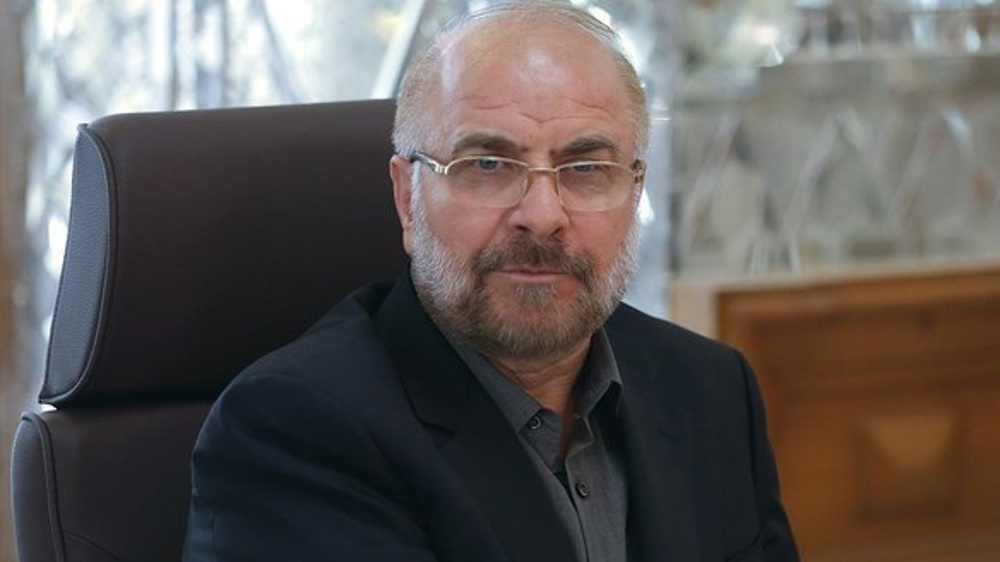Iran Parliament determined to stop voluntary implementation of Additional Protocol: Speaker
Iranian Parliament Speaker Mohammad Baqer Qalibaf says the legislative body is determined to completely stop voluntary implementation of the Additional Protocol to the nuclear Non-Proliferation Treaty (NPT) and restrict access to the country's nuclear sites.
"The Islamic Consultative Assembly is determined to bring implementation of the Additional Protocol to an end, limit access [to Iran's nuclear sites] and observe all relevant legal issues," Iran's Parliament speaker said.
"Therefore, any access beyond the Safeguards Agreement is forbidden and unlawful, and the legislative body is duty-bound to supervise this issue," Qalibaf said in an address to an open session of the Parliament on Monday.
He made the remarks after a number of Iranian lawmakers expressed their objection to an agreement reached between Ali Akbar Salehi, the head of the Atomic Energy Organization of Iran (AEOI), and Rafael Grossi, the director general of the IAEA, in Tehran on Sunday.
Grossi paid an official day-long visit to Tehran on Sunday and held talks with Salehi and Foreign Minister Mohammad Javad Zarif on issues relating to the IAEA's monitoring of Iran’s nuclear energy program. His visit came after Tehran officially informed the IAEA of its decision to end the voluntary implementation of the Additional Protocol, which allows the IAEA inspectors to carry out closer inspections of Iran’s nuclear program.
Iran and the International Atomic Energy Agency (IAEA) then issued a joint statement according to which, the two sides have reached a “temporary bilateral technical understanding.”
According to the statement, Iran will stop its voluntary implementation of the Additional Protocol to the NPT and will deny IAEA inspectors access to its nuclear facilities beyond the Safeguards Agreement as of February 23, 2021 for three months.
Back in December, Iranian legislators passed a law to further accelerate the development of the nuclear program. The law is a firm reaction to Washington’s 2018 withdrawal from the Iran nuclear deal – the Joint Comprehensive Plan of Action (JCPOA) – and the illegal sanctions the US has imposed against Iran since then.
Among other things, the law obliged the Iranian administration to stop allowing inspections beyond the Safeguards Agreement, including the voluntary implementation of the Additional Protocol, if the other parties to the JCPOA failed to deliver on their commitments.
In his address, Qalibaf said parts of commitments as per the recently-approved law have been previously fulfilled and the part related to the Additional Protocol should be implemented as of Tuesday.
Pointing to the Parliament's report on the government's breach of the law following the AEOI's agreement with the UN nuclear body, he added that Majlis is in charge of following up on and implementing rules and regulations.
"Parts of that law have been already implemented in due time and the part related to the Additional Protocol enters into force as of tomorrow," Qalibaf said.
He emphasized that Iranian lawmakers would not accept any violation of law and would pursue issues in line with Parliament's ratifications.
Addressing a press conference on Monday, Iranian Foreign Ministry Spokesman Saeed Khatibzadeh said the agreement with the IAEA is in complete conformity with the recent law passed by the Iranian Parliament.
Khatibzadeh said that under the agreement, Iran’s voluntary implementation of the Additional Protocol to the Non-Proliferation Treaty’s Safeguards Agreement will be suspended while some of the IAEA’s necessary verification and monitoring activities will continue for up to three months within the Safeguards Agreement.
In a statement issued by 226 members of the Iranian Parliament, they once again highlighted the necessity of stopping voluntary implementation of the Additional Protocol if sanctions imposed on the Islamic Republic remain in place.
SNSC: All IAEA inspections beyond Safeguards Agreement to stop on Tuesday
In a related development, the secretariat of Iran’s Supreme National Security Council (SNSC) announced on Monday that all inspections of Iran’s nuclear facilities by the IAEA beyond what has been stipulated by the Safeguards Agreement will stop as of Tuesday, February 23.
The SNSC spokesman, Keivan Khosravi, added that all concerned Iranian authorities are unanimous about the implementation of the parliament’s new law to safeguard the rights of the Iranian nation and the AEOI has so far implemented the provisions of the law, thus paving the way for halting any inspection of Iran’s nuclear facilities beyond the Safeguards Agreement.
“The implementation of the parliament’s law, however, does not mean that Iran is going to quit the JCPOA and cut all cooperation with the IAEA. Therefore, Iran’s interaction with the Agency and its Safeguards-based supervision will continue based on the existing legal frameworks,” he added.
Khosravi noted that the joint statement issued by Iran and the IAEA following the Sunday visit to the country by the IAEA’s director general has also stipulated that Iran will meticulously implement the new law as it has been passed by the parliament.
‘All wars have rules. All of those rules have been broken’ by Israel
VIDEO | Report flags India’s violation of rights of Rohingya detainees
Turkey's foreign minister meets Syria's de facto leader in Damascus
'Next to impossible' to rescue patients from Gaza's Kamal Adwan Hospital: Director
VIDEO | Vietnam current prosperity
Report blames gasoil exports for shortage at Iranian power plants
VIDEO | Hind Rajab Foundation names Israeli war criminals vacationing after Gaza genocide
VIDEO | Australians rally for Gaza ahead of Christmas festivities














 This makes it easy to access the Press TV website
This makes it easy to access the Press TV website